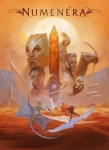
Rolling for Initiative is a weekly column by Scott Thorne, PhD, owner of Castle Perilous Games & Books in Carbondale, Illinois and instructor in marketing at Southeast Missouri State University. This week, Thorne travels from Kickstarter to brands.
(With apologies to George Thorogood and the Destroyers)
Originally, based on some threads I have read online, I planned to write up a discussion of what retailers and distributors do and don't do and why publishers may or may not need them, but instead cogitated about the points Charles Ryan of Monte Cook Games (and others) made regarding last week's column, which got me thinking about, once again, the importance of, you guessed it, brands.
As Ryan pointed out (see "Charles Ryan of Monte Cook Games on Kickstarter"), Numenera did quite well as a Kickstarter, raising just over $517,000 on a $20,000 goal or just about 26 times the target campaign amount. That's pretty dang impressive. However, would the Kickstarter have raised the same amount or beaten its goal by so many times if it had been a Kickstarter of a RPG created and written by new game designer Joe Adams? Likely not. Numenera got funded to the level that it did because Monte Cook has a reputation as one of the top RPG designers in the country, to the point where it caused people to question the direction the D&D Next project had taken when he and Wizards of the Coast announced they had parted ways on development. People know the quality of work of which Cook is capable and wanted to own it when his company announced it. People funded Numenera because of the Monte Cook brand, not because of the game itself. They expected great work.
Take a look at the top dozen Kickstarter projects funded in the past year. Go ahead, I'll wait. All of them are either reboots, sequels or rest upon the designer's name to boost interest in the project. There's even an online version of Numenera in there. The top funded project in the gaming category so far, (raising $8.5 million, OUYA, a video game console), doesn't even mention the designer's name in the first paragraph. Instead it tells you this product is designed by the creator of Jambox. Now I don't play video games, so I have no idea what Jambox is but lots of other people do, so when they saw that its designer planned to come out with a video game console, they were all over it, to the tune of $8.5 million in funding, over seven times the original goal.
Closer to home, WOTC has a new Magic: The Gathering Commander set of decks coming out in November. We already have people wanting to pre-order them, even before they know what comes in them. Why? They know the quality of past Commander decks and the quality of recent Magic releases. Sure WOTC can come a cropper (anyone remember Saviors of Kamigawa, C-23 or the X-Men TCG?), but WOTC succeeds so often with its Magic products that distributors, stores and consumers eagerly line up for the next release and will at least give Kaijudo a try.
Games Workshop has the same level of brand resonance with its product lines. When the new Space Marines codex came out at $58 a pop, I expected to sell maybe 4 in the first week or so. We went through a dozen in the first two weeks, with customers buying them without even looking through them. Again, why? The strength of the Games Workshop and the Warhammer 40,000 brand. Based on past experience, they know what to expect. The brand has power.
One final example, Pathfinder versus Dungeons & Dragons. Currently, which attracts more attention and sales, a new Pathfinder release or a new Dungeons & Dragons release? If a store is typical, it probably has more people playing Pathfinder than D&D and sells more Pathfinder than D&D. Which do you think will get more coverage in the press, though, announcement of a new edition of Pathfinder or the release of D&D Next? Comparing the PR surrounding the release of D&D 3.0 to that of Pathfinder, I would say it is a safe bet that D&D Next far outstrips a hypothetical next edition of Pathfinder, with much greater brand awareness both in and outside the industry.
Unsuccessful and new brands may beget successful products, but in the long run, customers opt for the familiar brand, until experience shows them otherwise (D&D 4th Edition, anyone?).
The opinions expressed in this column are solely those of the writer, and do not necessarily reflect the views of the editorial staff of ICv2.com.


